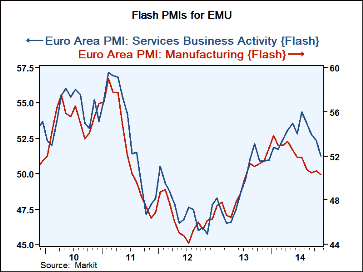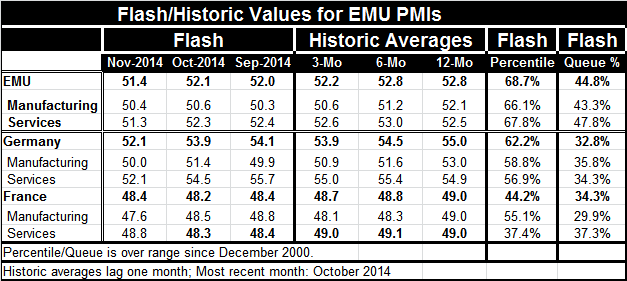 Global| Nov 20 2014
Global| Nov 20 2014EMU Flash PMIs Disappoint
Summary
The European Monetary Union has reported out weak readings for November. Its manufacturing gauge slipped and its services gauge fell by one point month-to-month. The overall EMU private sector reading stands at 51.4 in November, down [...]
 The European Monetary Union has reported out weak readings for November. Its manufacturing gauge slipped and its services gauge fell by one point month-to-month. The overall EMU private sector reading stands at 51.4 in November, down from 52.1 in October. This is its weakest flash reading in one year. The manufacturing flash reading was last weaker in June 2013. The services flash reading was last weaker in December 2013.
The European Monetary Union has reported out weak readings for November. Its manufacturing gauge slipped and its services gauge fell by one point month-to-month. The overall EMU private sector reading stands at 51.4 in November, down from 52.1 in October. This is its weakest flash reading in one year. The manufacturing flash reading was last weaker in June 2013. The services flash reading was last weaker in December 2013.
To appreciate the weakness, let's put it in the readings in the perspective of their historic queue standings. The EMU headline has been weaker only 44.8% of the time. The manufacturing gauge has been weaker only 43.3% of the time. The services sector reading has been weaker 47.8% of the time. All of these gauges are below their respective historic medians. All have been stronger more often than they have been weaker.
Despite the fact that markets were encouraged one week ago when GDP accounts were not quite as weak as expected, as we warned, that those releases were not guarantees that they would be the lowest readings in this cycle henceforth. It appears as though weakness is continuing to expand its reach. And since (1) EMU fiscal policy remains unhelpful to growth and (2) because the ECB's attempts to become more stimulative are being opposed by some members internally and (3) because the geopolitical situation has continued to deteriorate, it should be no surprise that economic conditions are continuing to erode in the euro area. It's too soon to expect much help from the weakened euro and, in any event, improved competitiveness won't be worth quite as much in a world in the grip of a widespread slowdown.
The table also memorializes the (private sector) PMI news for the two largest EMU economies, Germany and France. Let me just hit the key points here. Germany's private sector PMI has been weaker historically only 32.8% of the time; France's has been weaker only 34.3% of the time. While German index at 52.1 is stronger than the index for France (at 48.4), both occupy the same position relative to their respective historic norms. Yes, France is worse off since it is contracting. But both Germany and France are doing poorly and these are the two largest EMU economies.
The nations of the European Monetary Union are now on an automatic pilot to worse times ahead. European monetary policy is being restricted from being more stimulative and fiscal policy remains somewhere between guarded and contractive. There continues to be a shortage of demand for the world's goods. Prices are still weak as we see in the U.S. CPI gauge released today. World energy and commodity prices are slipping. World leaders have their hands in their pockets or have already decided that it's time to pay the piper for past excesses. The U.S. continues to do somewhat better than Europe, but it still is not well. The world is without an engine of growth and local economies East and West as well as North and South are losing momentum. No Surprise.

Robert Brusca
AuthorMore in Author Profile »Robert A. Brusca is Chief Economist of Fact and Opinion Economics, a consulting firm he founded in Manhattan. He has been an economist on Wall Street for over 25 years. He has visited central banking and large institutional clients in over 30 countries in his career as an economist. Mr. Brusca was a Divisional Research Chief at the Federal Reserve Bank of NY (Chief of the International Financial markets Division), a Fed Watcher at Irving Trust and Chief Economist at Nikko Securities International. He is widely quoted and appears in various media. Mr. Brusca holds an MA and Ph.D. in economics from Michigan State University and a BA in Economics from the University of Michigan. His research pursues his strong interests in non aligned policy economics as well as international economics. FAO Economics’ research targets investors to assist them in making better investment decisions in stocks, bonds and in a variety of international assets. The company does not manage money and has no conflicts in giving economic advice.
More Economy in Brief
 Global| Feb 05 2026
Global| Feb 05 2026Charts of the Week: Balanced Policy, Resilient Data and AI Narratives
by:Andrew Cates






